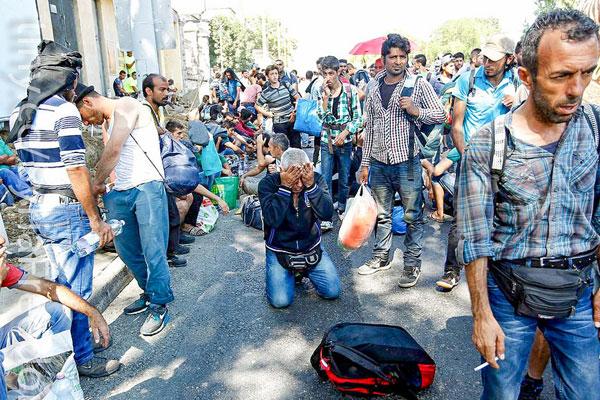Versus: Should The US Accept Syrian Refugees?
December 10, 2015
The crisis in Syria has caught global attention, from countries wanting to intervene in their domestic affairs to making decisions to take in refugees. Starting as anti-government demonstrations, the controversy elevated to divisions between ethnic groups and Islamic and secular fighters to complicate the conflict into a full-blown civil war. More than 200,000 have been killed to date from the four-and-a-half year civil war, and the remaining civilians in the country constantly live with hardships varying from bombings to human rights violations. These hardships have caused thousands of civilians to flood refugee camps and pressure countries into taking them in.
No: Syrians are a Threat To America
Despite Obama’s commitment to bring in 10,000 Syrian refugees over the next year, I believe that the United States should not take them in until increased security measures are put in place.
I know that my disapproval with Obama’s decision to take in refugees may make me sound “anti-American” or “prejudice” against Syrians, but my reasoning comes with the security of the United States in mind.
First of all, there is no possible way to verify the identity and credibility of Syrian refugees since the United States does not have access to Syria’s records because they don’t have any. Because of this circumstance, we won’t know if the Syrian refugees will pose a threat to the United States and its citizens. Increased security measures are necessary for these refugees not because they are a majority Muslim population, but because ISIS has a heavy influence over the area. With ISIS propaganda inundating Syrians due to their powerful control over the area, we don’t know what type of terroristic influences they have been exposed to. ISIS has had an extremely powerful influence globally, so the influence over direct areas of control such as Syria must be even greater. This should motivate the United States to promote increased security measures since we don’t have records to ensure that all refugees entering don’t have any affiliations with the terror group.
![Syrian refugees enter Sweden without documentation. [Creative Commons - Anders Mohlin - Used with Permission]](https://www.therideronline.com/wp-content/uploads/2015/12/refugge3-300x200.jpg)
Furthermore, a Syrian refugee has been linked to the terrorist attacks in Paris that took 129 lives. This shows to prove that ISIS’s influence over the area has affected some of the refugees. Although what happened in Paris may not happen in the United States, it should not serve as a rationale to allow Syrian refugees in without knowing their background. I’m not trying to generalize Syrians and assume they all might be associated to the terrorist group, but ISIS has been known to convert people so we need to make sure refugees coming in do not want to cause any harm.
There are currently 31 states refusing to accept Syrian refugees despite their lack of power to do so. Our national government has the sole authority to accept refugees and dictate what states they are to be transferred to. However, states opposing the foreigners have powers to complicate the process.
“There is some soft power being exerted by the states here even if there’s not hard legal ground for the state to stand on,” Pratheepan Gulasekaram, an associate professor of law at Santa Clara University said. “If this becomes a trend, I think it sets an extremely dangerous precedent.”
States have the power to block funding to programs that serve refugees and help them learn to assimilate into American society and culture. These programs include but are not limited to English language classes, government-funded services, and job training programs. Most governors are opposing the idea of refugees entering the country because they believe that some, not all, refugees pose a legitimate security threat because not all of them want to be “honest law-abiding citizens.”
Despite President Obama’s promise to induce the “most rigorous [screening] process conceivable,” most governors and the general public in opposition do not have enough trust that he will pull through with his promise. I honestly can’t blame them for having such a mindset. Obama has had failed promises on major legistlature such as his promise that the Healthcare.gov website would work smoothly when it launched. Because of the lack of trust, some states have taken action. Texas has already tried suing the federal government for forcing them to take in refugees, and Georgia has refused to process refugee food stamp applications. If the United States wants to create a smooth process transferring refugees and actually take its role as being a representative government, it should hear the states’ concerns out.
Even if the refugees do come in, can the United States ensure they will have a better life here? The government obviously doesn’t care about the states’ security concerns and that inevitably causes a hostile environment to those moving into the states of opposition. The number of homeless people, some of whom are veterans who risked their own lives for the safety of the country, is growing, and the United States isn’t making it a priority to help them. If we, as a country, can’t even help our own people, how do we expect to help others? I feel like we just accept these refugees because we feel as if we have a moral obligation to do so. However, it is also a moral obligation to ensure them that they will live comfortably here. They already have had it hard so why allow them come and make it hard for them again?
Overall, I’m not in opposition to accepting the refugees forever- I understand there are people who just want to have better lives away from the Islamic State. I just think the federal government needs to take in consideration that some refugees may serve as potential security threats,and until there it is a guaranteed that screening will be rigorous enough to sort out the threats, the opposing states will make it hard for the refugees. That defeats the purpose of them coming here. We shouldn’t be pressured into doing something just because we consider it a “moral obligation,” but as long as our current national leaders hold authority we have no power to stop the refugees from flooding in whether or not they pose a threat.
Yes: Syrians Should be Welcomed Here
Despite strong objections from many politicians following the attacks in Paris, Obama announced he would continue with his plan to allow 10,000 refugees to enter the United States, a decision I believe was the right one.
The crisis in Syria is not a new one, and goes back far further than Paris. You could blame Bush for intervening in Iraq and creating instability in the region, you could blame Obama for pulling out of the region creating a power vacuum or for failing to get rid of Syrian ruler Bashar Al-Assad. Whomever you might think caused the problem, the key is, we caused the problem. And as the old adage goes, “You break it, you own it.” We, as Americans, have an ethical and moral responsibility to help those whose country we have helped break. We did it following the Vietnam war, we did it following the Iraq war, and we should do it now.
The biggest concern with Syrian refugees following Paris is the possibility of extremists entering our country under false pretenses. Let’s examine the situation in Paris then. Of the six identified attackers, 5 are European Nationalists, not refugees. Only one, “Ahmad Almohammad”, arrived with a wave of refugees on the shores of Europe with a fake Syrian passport. He managed to slip in because thousands of migrants are arriving in waves directly into Europe. Now, that’s not exactly feasible in the U.S. because, well, the Atlantic. It’s not a comparable situation, and should not be treated as such.
The only way refugees are entering the country is through legal means, and that requires a screening process. A senior official at the U.N. called the screening process “the single most heavily screened and vetted.” It includes interviews, references with home country records, and biometric data including fingerprints and iris scans. On top of that, Syrian refugees are placed under additional scrutiny. This involves vetting between the State Department, FBI, the Department of Defense and the Department of Homeland security. The Department of Homeland security conducts in person interviews with every single applicant and past data is analyzed to ensure the refugee is consistent between applications. If no data is available, the request is frequently denied. This entire process takes up a year or possibly two. What’s been the result of this? Since the September 11th attacks, 750,000 refugees have entered the United States. None have been arrested for domestic terrorism.
![Syrian Refugees in Vienna Transtation [Creative Commons - Josh Zakary - Used with Permission]](https://www.therideronline.com/wp-content/uploads/2015/12/refugee2-300x196.png)
Thirty one states are now attempting to block the flow of refugees into their borders. That power though, rests solely with the federal government. In Hines v. Davidowitz the Supreme Court ruled that the federal government, and not the states, has “power over immigration, naturalization and deportation.” Other key legislation is the Refugee Act of 1980. This law says “the historic policy of the United States to respond to the urgent needs of persons subject to persecution in their homelands.” Including a clause for “unforeseen emergency refugee situation,” involving “grave humanitarian concerns.” Governors could attempt to defund programs involving refugee placement, but that could lead to multitude of issues. If they decided to not fund those programs, they would defund them for all refugees, not just Syrians, as singling out of one group would be discrimination and would be in line for suit under 14th Amendment grounds. The states are swatting at phantoms, as they have no authority to block refugees and to defund all refugees would be a betrayal of American values.
Ensuring better lives for refugees has never been an easy task, but it has always been one Americans have stood for. We should not let ourselves succumb to fear and betray our values. We have done it before, in 1939, when America was surveyed on their feeling involving Jewish immigrants, in which two thirds expressed negative feelings towards their immigration. Although the times and situation are vastly different, it’s a good historical example to look back on. Citing economic concerns following the great depression and seeing as many Jewish immigrants were feared of harboring hostile ideologies, and were rejected for that fear. Now, I’m not saying Syria is another holocaust, but we should not sit idly by as civilians are murdered by the same crimes we fear here.
Security is always a priority of the American people, but the past has shown that we can safely accept refugees from war torn countries. We should not allow fear to dictate our actions, and nothing can show this more poignantly than France’s insistence that it will still take 30,000 Syrian refugees. “Our country has the duty to respect this commitment,” said French President François Hollande. Or perhaps the inscription on the Statue of Liberty:
Give me your tired, your poor,
Your huddled masses, yearning to breathe free,
The wretched refuse of your teeming shore,
Send these, the homeless, tempest tost to me,
I lift my lamp beside the golden door!
This country stands for a lot of things, and we should not betray them out of an unfounded fear of an attack on our shores, an unlikely event made even more unlikely by the enhanced screening in place. We can not condemn thousands to a life plagued by fear because we fear them ourselves.

I'm Breton Hawkins and I'm incredibly excited to be joining Newspaper this year. I'm in pretty much everything else at Legacy, Drumline, AcaDec, Debate,...

